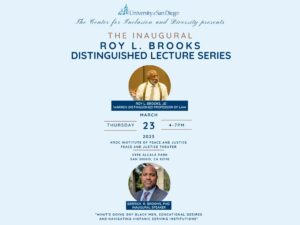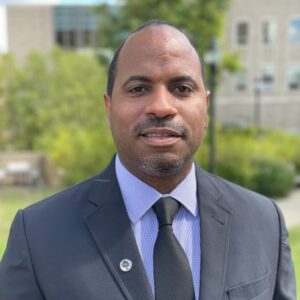

The event that I attended was the Inaugural Roy L. Brooks Lecture Series Event. This event took place on March 23, 2023, at the Joan B. Kroc Institute for Peace and Justice building here at the University of San Diego. At this event Dr. Derrick Brooms spoke on the theme of the college experience of Black men. Throughout this event Dr. Brooms talks about his own college experience and the struggles and lack of support he had throughout college. He also speaks on the college experience of other Black men and how they feel about being a Black man on a college campus. Dr. Brooms goes on to talk about how universities and institutions need to make changes to their campus to provide more resources for Black men so we can have more Black men succeed. This is important to our understanding of African American history because we are learning how history is repeating itself in a way. We understand how Black men were always looked down upon when it comes to their lives. We have a better understanding of African American history by highlighting the struggles, and stereotypes that have been placed on Black men through history. Despite the constant challenges and obstacles Black men face in their college experience, which includes systematic racism and cultural stereotypes, with the proper support and resources at colleges, they can achieve academic success, personal growth, and go on to be leaders and succeed in their communities.
When Black men are born, they already are being discriminated against. They’re already being doubted and already being told that they aren’t going to be anything in the future. As they get older they hear those things over and over. In college many people doubt their ability to graduate from the institution or university. Only 34% of Black males graduate from a higher education. The males in this 34% should be talked about more and praised. Instead our society focuses on the 66% who didn’t graduate. Society blames Black men for their lack of education and success. When the lack of their success comes from the lack of resources and support they have access to. If they had the same support and resources as white males, their success rates could and would be higher. One of the main things that Dr. Brooms focuses on, is how we can make college campuses more inclusive for Black men to seek success.
The way Black men are perceived is one of the ways as to why Black men don’t find success in the higher education system. Some of the pre-existing stereotypes that Black men are faced with are that they’re lazy, not academically gifted, and thugs. During the event, Dr. Brooms mentioned quotes by a Black male named Troy. Troy and Dr. Brooms were having a conversation about his experience in college being a Black male. Troy says, “Stereotypes. You know, I got tattoos everywhere; if I don’t wear a suit then you see them. That was my experience my first year, they used to look right past me. Being able to be that representation of Black males on campus or across all [these colleges]; basically being an advocate for my people and, also, I wanted to break the stereotypes.” Troy then goes on to say, “You know, Black people lazy; they say Black males are lazy. That’s the one [shaking his head in frustration and disbelief]… I’m involved in six organizations, I’m on campus six days a week. In my personal life, [the perception is] I’m just a ‘street thug’ [shrugs shoulders in seeming resignation]. We don’t graduate. Be that number of statistics who do graduate from [this college] and being able to be that asset to younger brothers coming up as well.” These quotes are showing how Troy felt like he was never taken seriously and overseen because of how he looked. Where in reality he was working hard and involved with organizations on campus, but no one would know looking at him because they all had their pre-existing stereotypes about him. He also felt as if he was seen as a thug because of his tattoos. So he wore suits so that wouldn’t be the first thing people think of when they see him. Which is a problem because clothing and what’s on a person’s body shouldnt determine their intelligence. Dr. Brooms also mentioned how many teachers and professors in the education system are worried about the clothes, speech patterns, and hairstyles that Black males are using instead of worrying about educating them.
In order to start seeing more success and graduation rates from Black men during higher education, we have to start making college campuses more inclusive for Black males. We need to provide more resources for Black males to take advantage of to help them succeed. With the proper resources we the amount of Black success could and would raise. At Historically Black Colleges or Institutes there’s a higher success rates for Black males because of the resources that these colleges and institutions provide. According to “Building Us Up: Supporting Black Male College Students in a Black Male Initiative Program,” “the supportive and family-like environments provided by HBCUs help to facilitate students’ self-efficacy, racial pride, psychological wellness, academic development and persistence”(Brooms 144). This is showing that the Historically Black Colleges and Institutes made the changes to their campuses to cater towards Black individuals and there has been improvements. These improvements are not surprising coming from colleges that cater towards Black individuals. In “Freedom On My Mind,” when talking about Black people and college they state, “Black increasingly sought to establish in their own schools, with Black teachers who could more closely identify with their students” (White 406). Which is proving that when Black individuals are receiving the proper support, they feel more understood and succeed more.
The next step is to make all colleges and universities inclusive with support for all Black individuals, but more importantly, Black men. With having these programs the campus will feel more welcoming and friendly. Some programs that can be added to campuses include, Brother2Brother, and Student African American Brotherhood. These programs are examples of Black Male Initiative (BMI) programs. The purpose of these programs is to focus on increasing the retention and success of Black male students, especially focusing on those at historically white institutes. Some of these programs are mentoring programs that help Black men get a better understanding of themselves and get a sense of self. From the research that Dr. Brooms completed, the students that are involved in these programs, “described BMI as nurturing, supportive, and encouraging, enabling them to enhance their collective identities and self-expectations. The participants emphasized that access to sociocultural capital helped to build community on campus, which ultimately supported their academic efforts and reaffirmed their cultural wealth” (Brooms 154). With spreading these programs to more historically white institutions, it can help set Black males up for success and help them enjoy their college experience both academically and socially.
In conclusion, the struggles that Black males face in college highlight the systemic racism, stereotypes, and the unfair education system. Although many Black men have fought against these things and came out successful, there is still a lot of work that needs to be done in the higher education system that supports and lifts up Black males to achieve their full potential. To fight back against these challenges, we need to provide Black Male Initiative programs on all college campuses to provide Black males with a support system and a community. By providing Black men with these programs, we will make the higher education system a more inclusive environment. Understanding the experiences of Black men in college, can help us better understand African American history. This is because we can work against the stereotypes and biases that have historically been placed on Black males to make a better environment. We also get an understanding that history is repeating itself and Black males have always had to work harder to succeed. With becoming aware of these issues in the higher education system, we can evolve and adapt to the needs of Black males and make the society more inclusive and give everyone an equal chance at succeeding.
Works Cited
Brooms, Derrick R. “‘Building Us Up’: Supporting Black Male College Students in a Black Male Initiative Program.” Critical Sociology, vol. 44, no. 1, 2016, pp. 141–155, https://doi.org/10.1177/0896920516658940.
White, Deborah G., et al. Freedom on My Mind: A History of African Americans, with Documents. Bedford/St. Martins, 2021.

